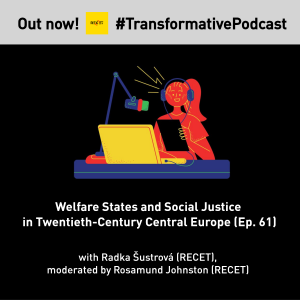
9.2K
Downloads
75
Episodes
Welcome to the Transformative Podcast, which takes the year 1989 as a starting point to think about social, economic, and cultural transformations on a European and global scale. This podcast is produced by the Research Center for the History of Transformations (RECET) and its managing director Irena Remestwenski. Our patron is Philipp Ther, and we could not do it without Leonid Motz, Jannis Panagiotidis, Rosamund Johnston, Sheng Peng, and Jelena Dureinovic.
Episodes

Wednesday Feb 26, 2025
Welfare States and Social Justice in 20th Century Central Europe (Radka Šustrová)
Wednesday Feb 26, 2025
Wednesday Feb 26, 2025
Studying social justice reveals the promises a regime - liberal or otherwise - makes to its citizens. It also reveals how citizens interpret these promises. But to what extent should we use the term “social justice” to understand societies excluding entire cohorts - most notoriously Jews and Roma in territories occupied by the Nazis during World War II? By focusing on exactly this period, and taking the example of the Nazi Protectorate of Bohemia and Moravia, Radka Šustrová discusses not only how welfare states (as much as culture, literature, or media) have historically cemented nationalist projects, but also how thoroughly illiberal concepts of social justice have historically been. In this episode of the Transformative Podcast, she reflects moreover on the extent to which this wartime inheritance impacted the postwar welfare states celebrated in Central Europe on both sides of the Iron Curtain.
Radka Šustrová is the author of Nations Apart: Czech Nationalism and Authoritarian Welfare under Nazi Rule (Oxford, 2024). She is a researcher at RECET and a lecturer in social history at Charles University in Prague. Her research focuses on the history of the welfare state, social justice, social and labour rights, women's activism, and nationalism in twentieth-century Central Europe. From 2020 to 2022, she was a British Academy Newton International Fellow and supervisor in history at the University of Cambridge. In 2022, she was awarded a Marie Sklodowska-Curie Fellowship at the University of Vienna. Her further publications include three books, several edited volumes, and articles in English, German, and Czech.

Wednesday Mar 19, 2025
Inferiority Complexes in Soviet Development (Alessandro Iandolo)
Wednesday Mar 19, 2025
Wednesday Mar 19, 2025
To what extent were Soviet engagements with the Third World characterized by solidarity during the Cold War? And to what extent did these same engagements conceal imperial ambitions? In this episode of the Transformative Podcast, Alessandro Iandolo (UCL) talks to Rosamund Johnston (RECET) about how concrete development projects could be viewed quite differently by the different actors involved. He also talks about how his own perspective on these projects has changed, as he approaches them in his new research from different angles. If all of those involved came to be almost in agreement on one point, he argues, it was that the world-building exercises they were involved in were somehow second best when compared to the material and intellectual resources of an imagined West.
Alessandro Iandolo is a lecturer at the School of Slavonic and East European Studies, University College London, specializing in the history of the Soviet Union in the world. His first book, Arrested Development: The Soviet Union in Ghana, Guinea, and Mali, 1955-1968, explored the Soviet Union's economic partnership with three newly-independent countries in West Africa during the Khrushchev era, winning the W. Bruce Lincoln prize for the best first monograph in Russian History, and the Marshall D. Shulman prize for the best monograph on the internationalrelations of the USSR from the Association for Slavic, East European and Eurasian Studies.

Wednesday Apr 09, 2025
Dismantling Authoritarian Rule in Poland (Jan T. Gross, Magda Szcześniak)
Wednesday Apr 09, 2025
Wednesday Apr 09, 2025
This episode captures (the beginning of) a conversation between cultural studies scholar Magda Szcześniak (University of Warsaw) and historian Jan Tomasz Gross (emeritus, Princeton University) who – while studying Polish contemporary history during the past decades – published a book co-authored by Stephen Kotkin on "uncivil society" in 2010. It offered a powerful explanation for the implosion of communism in 1989. Not long ago, we witnessed an election defeat of a non-communist authoritarian regime in Poland and are observing a tough and twisted process of dismantling that regime. The discussion is initiated and moderated by János Mátyás Kovács (senior researcher, RECET).
Jan T. Gross studies modern Europe, focusing on comparative politics, totalitarian and authoritarian regimes, Soviet and East European politics, and the Holocaust. After growing up in Poland and attending Warsaw University, he immigrated to the United States in 1969 and earned a Ph.D. in sociology from Yale University (1975). His first book, Polish Society under German Occupation, appeared in 1979. Revolution from Abroad (1988) analyzes how the Soviet regime was imposed in Poland and the Baltic states between 1939 and 1941. Neighbors (2001), which was a finalist for the National Book Award. He joined the Princeton History Department in 2003 after teaching at New York University, Emory, Yale, and universities in Paris, Vienna, and Krakow. Professor Gross is the Norman B. Tomlinson ‘16 and ‘48 Professor of War and Society, emeritus.
Magda Szcześniak is Assistant Professor of Cultural Studies at the Institute of Polish Culture, University of Warsaw. Author of Normy widzialnosci. Tozsamosc w czasach transformacji [Norms of Visuality. Identity in Times of Transition, 2016] and Poruszeni. Awans i emocje w socjalistycznej Polsce [Feeling Moved. Upward Mobility and Emotions in Socialist Poland, 2023].

Wednesday Apr 30, 2025
Social Justice: Rethinking Europe’s 20th Century (Martin Conway, Camilo Erlichman)
Wednesday Apr 30, 2025
Wednesday Apr 30, 2025
What does social justice mean in a European context—and how has that meaning evolved through dictatorship, democracy, and division? In this episode of the Transformative Podcast, Radka Šustrová speaks with historians Martin Conway and Camilo Erlichman about their new co-edited volume, Social Justice in 20th Century Europe (Cambridge University Press, 2024). Together, they explore the conceptual, political, and disciplinary challenges of writing a history of social justice—and how this approach unsettles classical narratives of 20th-century Europe. From labour and gender to postwar reconstruction and European integration, the episode offers a rich historical perspective on justice as both a contested idea and a lived practice.
Martin Conway is Professor of Contemporary European History at the University of Oxford. A leading scholar of postwar Europe, his research focuses on democracy, political change, and social transformation in the 20th Century. He is the author of Europe’s Democratic Age: Western Europe, 1945–1968 (Princeton University Press, 2020), a significant reinterpretation of the democratic transition in the postwar West.
Camilo Erlichman is an Assistant Professor of History at Maastricht University and co-founder of the Occupation Studies Research Network. His work explores occupation regimes, postwar transitions, and institutional change in Europe. He has published widely on the Allied occupation of Germany and contributes to broader debates on governance, legitimacy, and social justice in modern European history.

Wednesday May 21, 2025
Wednesday May 21, 2025
In this episode of the Transformative Podcast, Radka Šustrová (RECET) speaks with historian and human rights scholar Steven L. B. Jensen. Drawing on his recent keynote at the rountable titled “European Strategies for Strengthening Social Partnership and Labour Rights” in Vienna and his influential work on the global history of human rights, Steven Jensen explores how economic and social rights were fought for—particularly by socialist states and Global South actors—on the international stage after 1945. From Cold War diplomacy to the institutional battles within the United Nations and International Labour Organisation, this conversation highlights the legacies of internationalism, the enduring relevance of “the social,” and the global dimensions of justice.
Steven L. B. Jensen is a senior researcher at the Danish Institute for Human Rights. His work focuses on the historical development of international human rights, human rights diplomacy, and the intersection of global health and rights. He is the author of The Making of International Human Rights: The 1960s, Decolonization, and the Reconstruction of Global Values (Cambridge, 2016) and co-editor of Social Rights and the Politics of Obligation in History (Cambridge, 2022). His current research includes a political history of economic and social rights after 1945.

Wednesday Jun 11, 2025
Historian in the Age of Social Media and Disinformation (Franziska Davies)
Wednesday Jun 11, 2025
Wednesday Jun 11, 2025
Do historians have a responsibility to engage in public and political discussions? How can one balance the role of a public intellectual, an activist and a scholar? How can scholars rise to the occasion in the face of a changing media world and widespread disinformation campaigns? Can their institutions protect them from attempts to silence them through SLAPP suits (Strategic lawsuits against public participation)? In the field of Eastern European History, these questions have become particularly urgent after Russia’s full-scale invasion of Ukraine. Some scholars have chosen to speak out; others have chosen to remain silent. But in face of the dismantling of democracy in the United States and the rise of anti-democratic parties and movements in Europe, can we afford silence?
Listen to the whole conversation on our YouTube channel.
Franziska Davies is an assistant professor of Eastern European History at the Ludwig Maximilian University of Munich and is currently a visiting fellow at the IWM in Vienna. She specialises in the modern history of Ukraine, Poland, and Russia. She is currently working on a book about the end of the Soviet Union from a Ukrainian-Polish perspective.

Wednesday Jul 02, 2025
Transformations of Terrorism (Daniela Richterova)
Wednesday Jul 02, 2025
Wednesday Jul 02, 2025
Did Eastern Bloc states “aid and abet” terrorism, as US politicians like Ronald Reagan charged? Declassified archives in postsocialist Europe reveal a much more complicated story, as Daniela Richterova (King’s College London) explains. In this episode of the Transformative Podcast, she tells Rosamund Johnston (RECET) how Czechoslovak officials could “talk and at times align” with violent non-state actors such as Carlos the Jackal and Abu Nidal, while never themselves orchestrating attacks and maintaining throughout such negotiations “clear red lines.” Reflecting upon the ways in which terrorist tactics changed over time, Richterova lays bare both the dynamism and prudence employed by Czechoslovak officials when dealing with those she terms “jackals.”
Daniela Richterova is a senior lecturer in intelligence studies at the department of war studies, King’s College London. Her first book, Watching the Jackals: Prague’s Covert Liaisons with Cold War Terrorists and Revolutionaries appeared with Georgetown University Press in 2025. She has also published in International Affairs, The International History Review, West European Politics, and Intelligence and National Security.

Wednesday Jul 23, 2025
Socialist Tropical Medicine (Bogdan C. Iacob)
Wednesday Jul 23, 2025
Wednesday Jul 23, 2025
Is there socialist tropical medicine? Why is it important to write state-socialist Eastern Europe in the global history of medicine after 1945? In this episode, Bogdan Iacob tells Jelena Đureinović (RECET) about socialist tropical medicine, its development, purposes and understanding within Eastern Europe. He explains how state-socialist Eastern Europe shaped the assistance to postcolonial states and WHO programs and what discourses and hierarchies emerged in this context.
Bogdan C. Iacob is a historian working at the Nicolae Iorga Institute of History at the Romanian Academy of Sciences and the Institute for Habsburg and Balkan Studies at the Austrian Academy of Sciences. His work centres on the role of Eastern European experts in international organisations and post-colonial spaces, and he has contributed to the shifting of paradigm in transnational and global history of medicine, with Eastern Europe in focus.

Wednesday Aug 13, 2025
Everyday Postsocialism (Jill Massino)
Wednesday Aug 13, 2025
Wednesday Aug 13, 2025
What is postsocialism and how has it been experienced around Eastern Europe? Ambiguously, according to Jill Massino, the editor, with Marcus Wien, of a new volume on the topic: Everyday Postsocialism in Eastern Europe: History Doesn’t Travel in One Direction (Purdue University Press, 2024). From white-collar workers whose fates diverged, to sexual minorities who enjoyed some years of unprecedented openness and recognition before policy reversals wiped out perceived gains, Massino reflects upon the “complexity of experience” of this period, concluding, therefore, that history does not move in one direction. By foregrounding the perspectives of non-elites whose complaints about the present are sometimes dismissed as “nostalgic,” we might better understand, Massino suggests, the frustrations harnessed by populists today.
Jill Massino is an associate professor of history at the University of North Carolina at Charlotte. She is the author of Ambiguous Transitions: Gender, the State, and Everyday Life in Socialist and Postsocialist Romania and coeditor of Gender Politics and Everyday Life in State Socialist Eastern and Central Europe.

Thursday Sep 04, 2025
The disputed Austro-Hungarian Border (Hannes Grandits, Katharina Tyran)
Thursday Sep 04, 2025
Thursday Sep 04, 2025
In the aftermath of World War I, what used to be the Habsburg Empire split up into several nation states. But where to draw a border between the new Austrian Republic and the Hungarian nation state? In this episode, Leonid Motz (RECET) speaks with Hannes Grandits (HU Berlin) and Katharina Tyran (University of Helsinki) about their new edited volume The Disputed Austro-Hungarian Border: Agendas, Actors, and Practices in Western Hungary/Burgenland after World War I (with Ibolya Murber, published with Berghahn). They highlight how border-making was contested, negotiated, and experienced on the ground in one of the former Empire’s most multiethnic and multilingual regions—and what these debates reveal about nation‑state formation, identity, and transnational continuities in post‑1918 Central Europe.
Hannes Grandits is Professor of Southeast European History at Humboldt University in Berlin.
Katharina Tyran is Associated Professor in Slavic Philology at the University of Helsinki.
